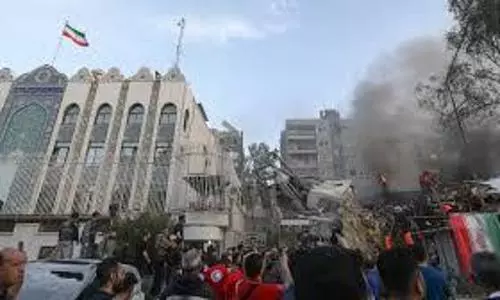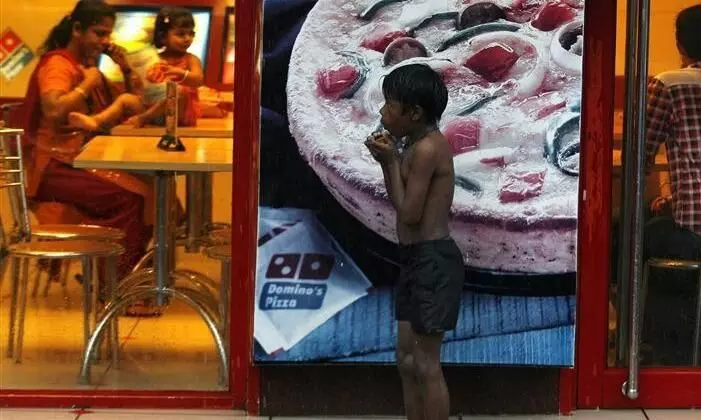
Introspection into the claim of ‘Viksit Bharat’ vs people, the real ‘Bharat’
text_fieldsIn an introspection spurred by a call for suggestions from the Union government on shaping a developed India, concerns about the country's current state of development have come to the forefront.
A report co-authored by Santosh Mehrotra and Rakesh Ranjan Kumar and published by The Wire, delved into the BJP government’s claim of a ‘Viksit Bharat’, only to find a contrast in the widely propagated economically progressed India, posing the question: What truly defines ‘Bharat’ in ‘Viksit Bharat?’
Santosh Mehrotra is a Visiting Professor at the Centre for Development Studies, University of Bath, UK and Rakesh Ranjan Kumar is a Senior Research Fellow at the International Institute for Migration and Development, Kerala.
The authors quote India’s first Prime Minister, Jawaharlal Nehru, who defines Bharat in a broader sense as not merely the land, rivers, and mountains within it, but also as the millions of people who call it home, eloquently making a point that it is the people who are Bharat, and the progress of Bharat is the progress of its people.
They have narrated a sobering picture of India's progress on the human development front after examining many indicators. According to the Human Development Report (HDR) 2023/24, India ranks 134th out of 193 countries, reflecting a marginal improvement from its previous position. Despite being the fifth-largest economy globally, India lags behind in key human development metrics, trailing countries like Sri Lanka, Bhutan, and Bangladesh.
The disconnect between economic growth and human development becomes apparent when examining India's GDP per capita, which stands at a modest $2,850, significantly lower than other leading economies like Luxembourg, Ireland, Switzerland, and Norway.
The report also quoted renowned economist Raghuram Rajan, who warned against falling prey to the allure of exaggerated economic growth narratives and highlighted concerns about the quality and reliability of GDP data.
Moreover, while the government touts poverty reduction initiatives, scepticism looms over the accuracy of poverty estimates. Critics argue that surveys often overlook marginalized communities, painting an incomplete picture of poverty in India. Income inequality exacerbates these disparities, with the top 1% of earners capturing a staggering 22.6% of the national income, according to the World Inequality Lab.
Amidst these economic challenges, access to basic amenities remains elusive for many Indians. Despite government claims of achieving open-defecation-free status, widespread access to clean sanitation facilities remains a distant reality. Similarly, initiatives like the Ujjwala Yojna, aimed at promoting clean cooking fuel, fall short of addressing the underlying issue of affordability for rural households.
The ramifications of inadequate development are starkly evident in health outcomes, with alarming rates of malnutrition and anaemia among children and women. India's dismal ranking of 111 out of 125 countries in the Global Hunger Index underscores the urgency of addressing these systemic issues.
Compounding these challenges is the pervasive issue of unemployment, particularly among youth, with a staggering 44% unemployment rate for 20-24-year-olds. The dominance of informal employment further exacerbates economic vulnerabilities, with a vast majority of the workforce lacking access to stable, salaried jobs.
As India grapples with these multifaceted challenges, it is imperative to revisit its founding promise of "Swaraj" – self-rule for all, especially the most vulnerable. Mahatma Gandhi's timeless mantra serves as a beacon of guidance, urging policymakers to prioritize the needs of the marginalized and disenfranchised.
In the quest for a developed Bharat, economic growth alone is insufficient. True development must be inclusive, empowering every citizen to lead a dignified and prosperous life. As the nation embarks on its journey towards transformation, it must heed the voices of the marginalized and ensure that the fruits of progress reach every corner of the country.
The authors conclude their view with a comment that the spirit of 'Bharat Mata ki Jai' lies not in empty slogans but in tangible improvements in the lives of its people, to claim India’s rightful place as a beacon of progress and prosperity on the global stage.
























